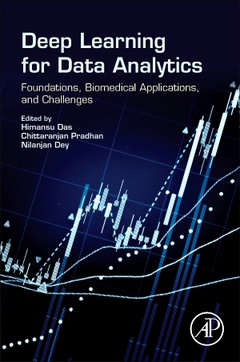Deep Learning for Data Analytics Foundations, Biomedical Applications, and Challenges
Coordonnateurs : Das Himansu, Pradhan Chittaranjan, Dey Nilanjan

Section I Deep Learning Basics and Mathematical Background 1. Introduction to Deep Learning 2. Probability and information Theory 3. Deep Learning Basics 4. Deep Architectures 5. Deep Auto-Encoders 6. Multilayer Perceptron 7. Artificial Neural Network 8. Deep Neural Network 9. Deep Belief Network 10. Recurrent Neural Networks 11. Convolutional Neural Networks 12. Restricted Boltzmann Machines
Section II Deep Learning in Data Science 13. Data Analytics Basics 14. Enterprise Data Science 15. Predictive Analysis 16. Scalability of deep learning methods 17. Statistical learning for mining and analysis of big data 18. Computational Intelligence Methodology for Data Science 19. Optimization for deep learning (e.g. model structure optimization, large-scale optimization, hyper-parameter optimization, etc) 20. Feature selection using deep learning 21. Novel methodologies using deep learning for classification, detection and segmentation
Section III Deep Learning in Engineering Applications 22. Deep Learning for Pattern Recognition 23. Deep Learning for Biomedical Engineering 24. Deep Learning for Image Processing 25. Deep Learning for Image Classification 26. Deep Learning for Medical Image Recognition 27. Deep learning for Remote Sensing image processing 28. Deep Learning for Image and Video Retrieval 29. Deep Learning for Visual Saliency 30. Deep Learning for Visual Understanding 31. Deep Learning for Visual Tracking 32. Deep Learning for Object Segmentation and Shape Models 33. Deep Learning for Object Detection and Recognition 34. Deep Learning for Human Actions Recognition 35. Deep Learning for Facial Recognition 36. Deep Learning for Scene Understanding 37. Deep Learning for Internet of Things 38. Deep Learning for Big Data Analytics 39. Deep Learning for Clinical and Health Informatics 40. Deep Learning foe Sentiment Analysis
Chittaranjan Pradhan is working at School of Computer Engineering, KIIT University, India. He obtained his Bachelors, Masters and PhD degree in Computer Science & Engineering stream. His research are includes Information Security, Image Processing, Data Analytics and Multimedia Systems. Dr. Pradhan has published more than 40 articles in the national and international journals and conferences. Also, he has been associated to a number of events organized at national and international level. He is also associated with various educational and research societies like IACSIT, ISTE, UACEE, CSI, IET, IAENG, ISCA etc. He has also experience of more than 10 years in teaching and research activities.
Nilanjan Dey is an Associate Professor in the Department of Computer Science and Engineering, Techno International New Town, Kolkata, India. He is a visiting fellow of the University of Reading, UK. He also holds a position of Adjunct Professor at Ton Duc Thang
- Presents the latest advances in Deep Learning for data analytics and biomedical engineering applications.
- Discusses Deep Learning techniques as they are being applied in the real world of biomedical engineering and data science, including Deep Learning networks, deep feature learning, deep learning toolboxes, performance evaluation, Deep Learning optimization, deep auto-encoders, and deep neural networks
- Provides readers with an introduction to Deep Learning, along with coverage of deep belief networks, convolutional neural networks, Restricted Boltzmann Machines, data analytics basics, enterprise data science, predictive analysis, optimization for Deep Learning, and feature selection using Deep Learning
Date de parution : 05-2020
Ouvrage de 218 p.
19x23.3 cm
Thèmes de Deep Learning for Data Analytics :
Mots-clés :
?Abnormality detection; Alzheimer’s disease; Arrhythmia; Artificial neural networks; Autoencoders; Bidirectional LSTM; Biomedical; Breast cancer; Breast thermography; CNN; Cardiac diseases; Convolutional neural network; Convolutional neural networks; Crop disease classification; Deep ELM; Deep learning; Diagnosis; Downsampling; ECG; ECG classification; ELM autoencoder; Electrical impedance tomography; Extreme learning machines; Features extraction; Hessenberg decomposition; Image decomposition; Image reconstruction; Information retrieval; Infrared image; Long short-term memory; Matching function learning; Modified backprojection; Myocardial infarction; PCG; Radiographs classification; Recommendation system; Relevance learning; Representation learning-based methods; Scalogram; SqueezeNet; Support vector machines; Time series; Transfer learning; URL classification; Wavelet transform



